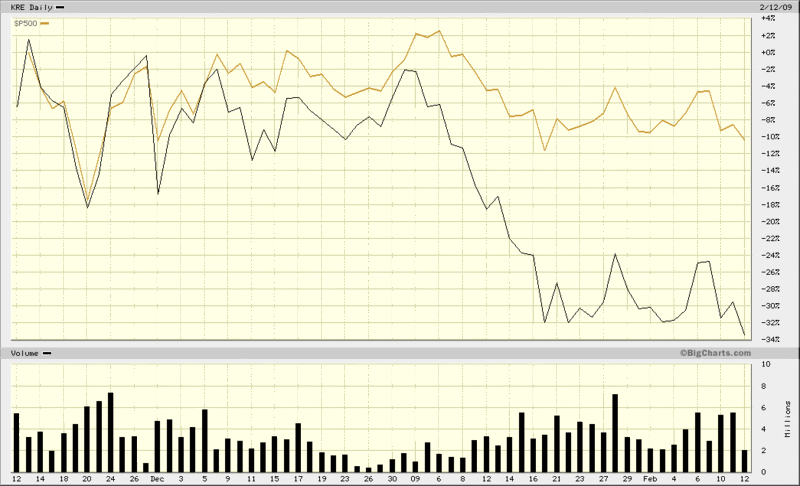Regional Banks in Trouble
While the first six weeks of 2009 have seen pockets of bullishness in stocks, one sector that has been notably absent from the occasional bursts of buying activity has been financials. Within the financial sector, the weakest of the weak has been regional banks, which will see little in the way of benefits from TARP 2.0 and stand to lose a great deal if the consumer credit crisis continues to deepen, as almost everyone now expects will be the most likely scenario.
In the three month chart below, you can see that since the beginning of the year, the S&P 500 index has given up about half of the gains it has made since the November 21st bottom. The regional banks, on the other hand (represented here by KRE, an ETF), have fallen sharply below their November lows and are now even below the lower lows of January and early February.
There is little doubt that regional and local banks have huge fundamental challenges ahead of them. I have seen estimates that 10% or more may even fail before the economy can be nursed back to health.
If regional banks continue to reflect deteriorating valuations, I find it hard to believe that the broader market will be able to shake off this concern and manage a significant rally. At the very least, I would expect the market to be no better than range bound at least until the stocks of regional banks can be taken off of life support.

[source: BigCharts]


4 comments:
Bill, could you steer me to an explication of how/why "regional banks.. will see little in the way of benefits from TARP 2.0". If you have one handy..
fwiw, I think the one market above all that the Powers that Be *must* defend is.. The primary Treasury bond auction market. All else follows.
I probably overstated the case with respect to regional banks.
My thinking was that regional banks will have more problems coming down the pike as consumer loans, small business loans and commercial real estate loans come under increasing pressure.
It sounds as if Geithner et al. recognize this problem and hope to be able to address it, but my concern is that an infusion of capital will not address the underlying issues that are undermining these three types of loans.
Of course if we can't sell our federal debt, as you say, nothing else is going to matter.
I heard some skeptics opine that Geithner purposely left out a lot of specifics on Tuesday so that the market would tank and drive investors into the arms of the newly issued debt. An interesting thought...
Cheers,
-Bill
If TARP 2.0 can provide some
Well.. I overstated the focus of the bailout on primary dealers. It was *such* a nice simplifying assumption, but on further review, the supporting evidence is not conclusive. Another fine theory blown to smithereens.
Reality is a epistemological schoolteacher nun, ruler in hand.
Guys,
It was very weird last week the TALF had GS, MS and a lot of larger financials' volatilities falling despite the shares being under pressure. Yet, the regional banks saw volatility explode higher. This is likely because of the read through about the 13 "too big to fail" and investment banks versus those under $100Bn of assets where there is likely not enough money and it not deployed quickly enough to save the equity holders.
Regional banks have been well covered by Calculated risk here:
http://www.calculatedriskblog.com/2009/02/mit-cre-price-index-declines-sharply.html
and here:
http://www.calculatedriskblog.com/2009/01/bank-failures-and-commercial-real.html
and here:
http://www.calculatedriskblog.com/2009/02/cre-boston-haircut.html
Capital market arbitrage (to Bill's point about the flight toward debt spurred by some commentary) has equity vols off the charts across some financials while others are now viewed as "more" safe and vols are declining post earnings.
Post a Comment